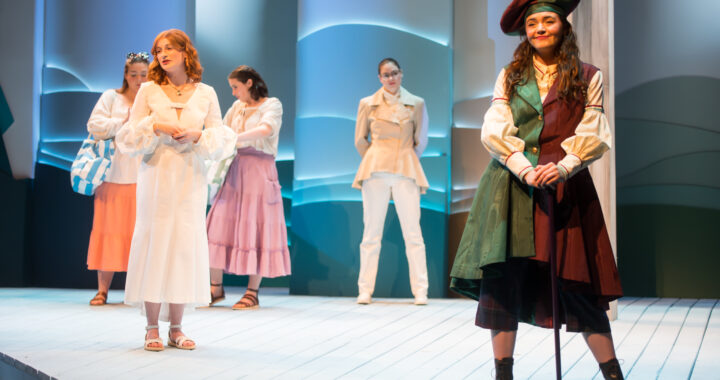Book review: “Vita Nostra” critiques higher education, takes readers to suspenseful, secluded school
4 min read
Julia Meitov Hersey translated the book to English from its original language. | yuliamh, Instagram.com
by BERNADETTE D’AURIA
Staff Writer
Translator Julia Meitov Hersey describes the lyricism in “Vita Nostra” as “deceptively simple and straightforward.” When she was tasked with translating the book from its original form into English, she faced a challenge in replicating a simplicity that “morphs from emotional to cerebral to metaphysical and back within a single paragraph.”
Hersey certainly succeeded in this venture, as the praise for “Vita Nostra” printed in the book includes acclaim from The Washington Post and award-winning novelist Lev Grossman, who credited the book as a “powerful influence” on his own writing.
Recently, the novel has been floating around on BookTok, a subsection of TikTok that focuses on, you guessed it, books. As one TikToker put it, the Dyachenkos’ novel is “Kafka if it was set in a magical school.”
All this being said, what is “Vita Nostra”?
Originally published in 2007 in Ukraine by author duo Marina and Sergey Dyachenkos, “Vita Nostra” follows sixteen-year-old Sasha Samokhina and her enrollment into the Institute of Special Technologies, a secluded university that leads Sasha into a very different life than the one she had imagined for herself.
When I selected “Vita Nostra” from the pile of books that I have been meaning to read, I was initially frustrated by the novel’s pacing. In retrospect, I can tell that this is the authors’ intent, as Sasha herself is frustrated with the situation she finds herself stuck in. The novel opens up with a recently graduated Sasha vacationing with her mother at the beach. During this holiday, Sasha is coerced by a strange and menacing man into attending a secluded university. How is she coerced? By being forcibly trapped in a time loop that does not end until she starts to cooperate. The time loop aspect of the novel’s opening is frustrating because, like Sasha, you as the reader have no idea what is going on. However, by positioning the readers into a mindset where they only know the information that Sasha knows, the authors are able to construct an extremely suspenseful novel. The more Sasha wants to know the answer to something, the more you do as well. It makes her eventual obsession with learning the purpose behind the institute so much more believable, as you are just as eager as her to learn.
Learning is at the heart of this novel, or rather, the institution of higher learning. One of the novel’s primary concerns is the tyrannical nature of higher education. At the Institute of Special Technologies, first-years are regulated to knowing nothing about the purpose of their classes, assignments or attendance. The professors are purposeful in their withholding of information and are repetitive in their notion that everything will make sense after their year three winter exams.
Knowledge is put on a hierarchy and only those with the power, prestige and experience are able to attain it. When Sasha falls behind pace, she is punished. When she moves ahead of her pace, she is punished. The institute, under the guise of protection, aims to keep itself at the top of the educational hierarchy and refuses to let any one student or group of students dismantle it. It’s an eerie depiction of the gatekeeping that goes on within higher education.
Another criticism of higher education that “Vita Nostra” tackles is its overall destructive nature. It’s no secret that attending university is a stressful endeavor, and Sasha’s experience is no exception. Throughout the novel, students at the Institute of Special Technologies are pressured to succeed, as a consequence of their failure could be the death of a loved one. While reality may not have a literal representation of this extreme circumstance, pressure to succeed in order to support your loved ones is a real thing. As the exams for Sasha and her classmates draw closer, so does your dread, as you and the characters know the consequences of failure.
Sasha’s pressure is heavier than her peers, as she is labeled a top student early on in her studies. This means that the professors at the institute expect more from her and that the consequences of her failures are even loftier than those around her. Throughout the novel, Sasha will go days without sleeping, hours without eating, and will isolate herself away from friends and family. Her desire to succeed is driven both by her need to uncover the secrets of the universe and her fear of failure. Her feelings are not uncommon from what many college students will feel at one point, making Sasha a very relatable character despite her eccentricities.
Language also plays a profound role in the Dyachenkos’ novel. While the novel is translated, the duo’s original exploration into the meaning and impact of certain words on the world is not lost. The Dyachenkoses aim to explore how words construct the world around us, both those that are spoken and unspoken. They explore the relationship between the words “love” and “fear” and how they are intrinsically tied together—as you cannot love something without fearing for it.
Overall, if you are looking for a read that is suspenseful, critical of higher education and mesmerizing in its prose, I suggest picking up a copy of this novel. Once you get through its initial slow pace, it’s a quick and addicting read that leaves you questioning the world around you.











